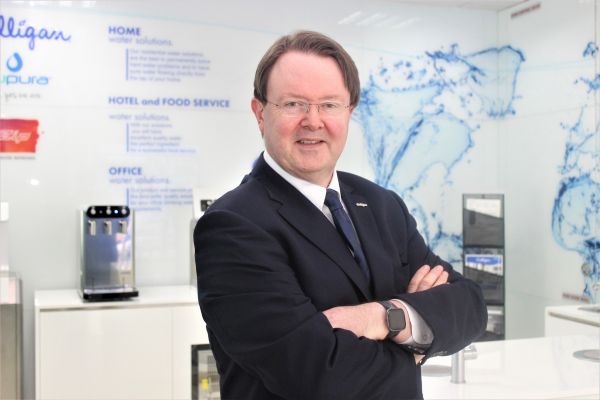Kate Stanners

Chairwoman and global chief creative officer, Saatchi & Saatchi
I hate getting up, so the fact that I have to be up early – around 6am – is still a shock to the system.
I have a quick shower, get dressed, then it’s a question of making sure my son, Otto, is up, has a good breakfast, has all his school stuff, and getting him to the station. I then get back to the house to sort the dogs, Dino and Rocky, then finally myself.
My commute begins with a 25-minute walk to the station. I use this time to think, to plan, to concentrate on what I haven’t done, what needs to be done and what should be done.
I try to not be on the phone, not even to listen to a podcast. For me, my commute is a brain detox. I have a few stops to Temple, and a 10-minute walk through an unchanged London. Beautiful. Sometimes I catch the river bus, and marvel at the city from the Thames and imagine all who travelled that way before me. The route Henry VIII and Oliver Cromwell once took.
My nutritional intake starts with a Pret A Manger stop, as I walk up Chancery Lane to the office.
Then, it’s straight into the first meeting, which could be anything – client meetings, creative reviews (my personal favourite), internal management or production sessions and collaborations.
The only consistent thing is a couple of trips to Pret for a cappuccino. I need to get up and out, every now and then, to process each session I’ve had.
If I’m going to meetings, I will always try to walk or take the train. I can’t deal with being stuck in traffic. But I also think I need that time to be on my own, as I spend every other waking hour with groups of people.
Idea-mode, for me, comes from conversation. I am not a linear thinker; I need to feed off other people. I need to be around people. I am constantly delighted by the amazing people I get to work with. I am eternally curious, I always want to know more or understand the stuff I don’t. I am lucky to be surrounded, and stimulated, by lots of very clever people.
For mental breaks, stepping outside, a walk to the Fleet Street Press coffee shop for a piece of millionaire’s shortbread is essential to keep the energy levels up. And Pilates twice a week – more for the mental challenge, as well as the physical, when you are upside down, hanging from ropes.
Josy Paul

Chairman and chief creative officer, BBDO India; chairman of the Film, Print and Publishing and Glass Juries, Spikes Asia 2019
As soon as I wake up, I listen to two “spiritual” songs: Shine On You Crazy Diamond by Pink Floyd and Mountain Hare Krishna by Krishna Das and Sting. It’s my morning “raga”, my personal prayer. I’ve been doing this religiously for the past 25 years. I also have a warm ginger-lemon-honey drink. The whole thing is a cleanser and a lifter.
I drive to work listening to the radio, switching stations like a DJ and moving fluidly between western and Indian music. I love the two worlds we live in: this duality has been our creative journey. When I arrive, I walk around the workspace feeling the energy. Our office is an ashram (a spiritual retreat), an open creative community centre, based on Gandhi’s ashram. I go around asking if there’s anything that anybody needs me for urgently, because there’s always something that requires immediate attention.
My days are never the same, but one of my most consistent habits is to go around arranging things, trying to form imaginary patterns. It’s a bit obsessive, but my colleagues find it amusing.
To help us all get into our creative flow, one of the things I do is bring the diverse talent of the agency into our meeting room to conduct what we loosely call “creative therapy” sessions. These are open, heart-and-soul discussions about our relationship with a brand or category. We leave judgment outside the door and enjoy each other’s company: it’s an open bonfire of human emotions. As we go deeper into sharing, it often turns into personal confessions that uncover the hidden motivations, truth or lies about the brand or category. It’s serendipity. It’s empathetic. It’s very therapeutic. It leads us to ideas that go deeper than “advertising”.
Curiosity has always given me focus. I like to dig deeper – there was a time when I wanted to be an archaeologist. My worst habit at work is probably not wanting to close things, or letting things incubate for too long.
When I leave the office, I like to call my parents, and message my friends and family. WhatsApp helps greatly. Unwinding takes time. I watch documentaries on Netflix with my wife (reality is my escape) and sometimes I read an essay. Before I sleep, I drink a mug of hot water. I always leave a light on.
Rob Doubal

Chief creative officer, McCann UK; co-president, McCann London
I don’t think of myself as a highly creative person. I would say I’m an averagely creative person. So, therefore, have all the hallmarks of a highly creative person, but in such homeopathic quantities that no one could really learn anything from them. That’s why I have to work so damn hard.
I get up in the morning. Most average creative people do. Because I have a job. I guess if I was highly creative, I probably wouldn’t get up at all. Because I’d be taking six months off to be making a 30ft papier-mâché porpoise and would be trying to sustain my hypnogogic state as long as possible, in order to figure out how to approach the shaping of the awkward lower jaw in a way that retains the beast’s full majesty.
Anyway. I get up. I do all of my best thinking in the morning. My mind is clear before it gets filled with other people’s concerns. So, when I arrive at the office, I catch up with EA Debbie, who is having trouble renovating her new house, and partner Lolly, who has just had a new child. Debbie deals with her issues briskly, but Lolly will spend no less than 45 minutes complaining how tired he is. He has also calculated he will be 65 when his second child is 20, which doesn’t help his feeling of tiredness. Or mine. (I have three kids.) So, off to a good start. But the mind is still fresh.
Things have got pretty bad when people are relying on Lolly and I to come up with ideas. We generally stumble upon them by accident when talking about other people’s ideas. And they tend to sound exactly the same as other people’s ideas. Just more like ours when we say them. But if we ever have to dust off our boots and originate, we have a few methods.
Go out the office. Watch tangential material. Watch your favourite clips. Read the paper. Read your favourite stuff. Tidy your desk. Read New Scientist. Ask someone random, something random. Talk about something else completely. Go and sit quietly in a room for ages. Concentrate, damn it. Concentrate. Generate some fear. Put some pressure on. Think. Think. Tea. Coffee. Walk. Cold shower, if possible. Banana. Repeat. Repeat. Repeat. Write. Work. Think. Put it down. Edit it down. Until you have something good. Then relax. And dream of the porpoise.
Tara Mckenty

Creative director, Google APAC; president of the Innovation Jury, Spikes Asia 2019
I would like to say my morning routine is an aspirational ritual, like a run along the coast or a half-hour meditation session. But it consists of a bit more chaos than that, juggling getting myself ready with getting my toddler ready. I do, however, make time every other Friday to do something I love, which is to get up at 4am, drive an hour to a bull-shark-ridden river, and fit in a two-hour wakeboarding session with a few other colleagues, before arriving at work by 9am (hair still wet).
I live at the beach (Tamarama) next to Bondi in Sydney, which is terrible for public transport, so I drive 30 minutes to work and use the commute for work calls with markets in conflicting time zones (safely using hands-free, of course).
I work across Asia-Pacific and the majority of my team is based in Tokyo so I use the mornings while they are still offline to get as much work done before the emails start hitting my inbox. I also find mornings are when I am at my sharpest, so I try to reserve this time for any critical thinking or concepting that needs to be done. Often you can spend the entire day at a screen but I’m a people person, so I make time every day for general banter with my team and co-workers. Interaction gives me energy; I feed off it.
To get to truly insightful creative solutions, you need to spend time with your user or audience and immerse yourself in the subject matter. I used to work on the All Blacks for Adidas in New Zealand, and I would always go to a game before concepting. I even went and trained with a women’s rugby team.
This is going to sound counterintuitive, but not being at work is when I work – in terms of ideation and concepting – the best. The more diverse your experiences and surroundings, the more you have to draw from when you’re coming up with new ideas. Seeing a piece of street art from a different neighbourhood, for example, could influence a typography solution for a campaign. My flow is experiencing difference.
That said, I find it really hard to maintain concentration. I flip from task to task, and was always the kid with the report cards that said: “Needs to stop distracting others in class.” I have, however, developed a few techniques, such as daily to-do lists, to help me hone my concentration. I also use my calendar to allocate time for individual tasks – and I am quite partial to a regular goal-setting session. Strangely, I think creative beings are the ones that need structure the most.
My worst work habit is that I get obsessively passionate and excited about an idea before either the technology is there or I know the idea is feasible. And then two things will happen. First, I will get everyone excited about something that is impossible – my previous employer, Saatchi & Saatchi, says “Nothing is impossible” – well, sometimes things are. Second, I’m left with a feeling of disappointment. I have had to learn to manage my own expectations. I just love creativity. It is hard not to be excited all the time about what creative thinking can solve and achieve.
Work can certainly be stressful: we work in a very fast-paced industry. At Google, we have more than 300 products and platforms, and often even the thought of keeping up with that technology can be anxiety provoking. The one thing that has always worked for me in combating that is exercise. After a busy day at work, there is nothing better than going to a boxing class and hitting a bag or kicking a football around at training.
When I get home, I’ll hug my son, pat my dog and share a meal with my wife – in no particular order. If I get to do all three at the same time, then I’ll say to myself: “This is living.”
Nils Leonard

Founder, Uncommon Creative Studios
The morning is mine. My wife Charlotte is a writer and hates mornings, so I get the early part to myself. Before our three sons rise, I’ll have a pot of coffee, open the back door (regardless of the weather, the smell and sound of rain into the plants in the morning is always excellent) and get some music in the house. I’ll plan here, and let the day begin. Find yourself time, no-one else will.
British men aren’t taught style by their families. The French are. They teach their daughters this flowing elegance and, somehow, a constant visual link to their style icons from the 1960s, their sons seem to have this ability to wear cashmere with no T-shirt from birth. But we are not, so most of us dress terribly until 40, when we work out an important lesson that what we feel comfortable in is what we look good in. I’ve stopped pissing around with patterns and logos. I have garments I love that I pay well for. Black, navy, white. I dress fast. Have decent shower gel, and an aftershave you can’t purchase in an airport.
If I don’t get breakfast with my three boys I get sad, I’ve worked out that I need home to be OK or nothing really works. Also, as a cabbie once told me: it’s not going to be that client wiping your arse in the cancer ward at the end, mate. Family wins. We do breakfast, play some drill music very loudly before school and have a laugh. Also, I find in adland, children are essential for not becoming a record-collecting twat, obsessed with sneakers and yourself.
I ride a scooter to the office because the Tube is rank. It takes me 20 minutes and, in summer, you feel like the prince of cats as you glide up Rosebery Avenue. A bit less glamorous in February.
Before you run your own company, you work hard, but when you start up, it’s different. You work deep. Every meeting is a chance. Every email heavier. Every minute more valuable. In my previous life, you’d have to find a way to marry clients, and often people, of differing levels of ambition but Uncommon set its stall out early and believes the mission to its core. Luckily, we attract clients that share that ambition, so the game every day is the same: just kill it, make stuff that matters and have a proper laugh.
When I need a break, I wander up Leather Lane and fantasise about the prawn shack I’d run if I worked there. When we celebrate, or sometimes when we’ve had enough, we bolt and take over the bar at St John: a mass scoff and quaff of Welsh rarebit and litres of Les Clos and some atrocious behaviour. I heard that in New Orleans when you die, your mates carry you around in your coffin to all the places you loved. If that happened in London, I’d end up getting left under a table in this joint.
Advertising has stolen many a founder’s family, so work hard in the day and stop wanging on at the edge of someone’s desk. Get home. I’ll eat dinner with my lot, steal my wife’s excellent words for my work (she has enough genius to go around) and, as they head off to bed, I’ll often come back to something from my day in the kitchen on my own. I don’t need a lot of sleep, and the space at the close of the day is a delicious time to write.
I’ve never believed that museums and books really help you when you’re stuck, they’re great in the inspiration bit, but people are the answer when you hit a wall. All we are is the people we hire. The more diverse and different the crew in your building, the more diverse and different the answers you get, so we work hard at that. I’m humbled to say that I currently work with the best people I ever have. Like Stormzy said: “You’re a prick by yourself, go and group up.”
Alex Grieve

Chief creative officer, Abbott Mead Vickers BBDO
I need habits because most days I feel anything but “highly creative”.
What I feel is “highly full of doubt”.
Over time, I’ve come to understand this is a good thing.
The moment you believe you are the business is normally the moment the business stops believing in you.
Habits are behaviours repeated frequently to create a routine.
And routine is the thing that gives me the best chance to be creative.
One of my favourite books is What I Talk About When I Talk About Running by Haruki Murakami.
In it, he describes how the routine and discipline of running mirrors the writing process.
It’s hard. It hurts. It takes stamina.
Creativity, alas, does not happen in moments of glorious eureka but, rather, is drawn out, sometimes monotonous and often frustrating.
It’s graft. And to graft you need habits.
I won’t describe my habits.
I always find reading about people’s daily habits akin to someone telling me about their dreams.
Dull, dull, dull.
I expect you do, too.
Also, they can be dangerous. They allow the corporate warrior the opportunity to turn habits into an ultra-competitive sport.
It’s all, of course, bullshit and all it does is make people feel shitty.
So rest assured, I have managed to climb the greasy pole by not waking every day at 4am to meditate, do yoga, drink fermented acai berry tea and fill in my gratitude journal.
My habits will be like your habits: coffee and podcasts on the commute, as much cycling as possible, as little social media as possible, making my bed every morning, reading every night and – this is the most important – good sleep.
The more I can string these habits together, the better I feel, and the better I work.
Murakami said: “Writing novels is basically a form of manual labour.”
If so, then habits are the spade, the trowel and the hammer that allow us to complete the job.





Recent Comments